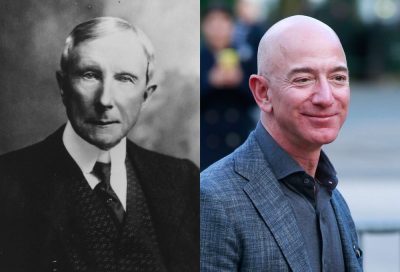Rockefeller Was Almost Three Times Richer Than Bezos

PHOTOGRAPHER: HULTON ARCHIVE/GETTY IMAGES (ROCKEFELLER); KENA BETANCUR/AFP/GETTY IMAGES (BEZOS)
…….Carnegie, Vanderbilt, and William the Conquerer’s cousin were wealthier too, when you measure their fortunes relative to GDP
$213b
Bill Gates (b. 1955): Microsoft Corp. co-founder whose foundation alone has a $51 billion endowment
$93b
Warren Buffett (b. 1930): Berkshire Hathaway Inc. chairman known for frugality (by billionaire standards)
$331b
John D. Rockefeller (1839-1937): Oil magnate usually considered the world’s first billionaire
$321b
Andrew Carnegie (1835-1919): Sold his steel company to J.P. Morgan for $480 million in 1901
$238b
Cornelius Vanderbilt (1794-1877): Shipping and railroad tycoon who built Grand Central Terminal
$169b
John Jacob Astor (1763-1848): Merchant who invested in New York real estate
$41b
James Brydges (1673-1744): Became the first nonlanded British millionaire in the South Sea Bubble
$53b
John Spencer (d. 1610): Merchant who traded with Spain and Turkey and became lord mayor of London
$25b
Eleanor of Aquitaine (c. 1122-1204): The queen consort and duchess owned vast European estates
$203b
Alan the Red (c. 1040-1093): William the Conqueror’s cousin held much land after the Norman Conquest
$28b
Gaius Appuleius Diocles (b. 104): The charioteer’s winnings could’ve provided grain for Rome for a year
$210b
Marcus Licinius Crassus (c. 115 B.C.-53 B.C.): Roman politician-general beat back Spartacus’ slave revolt

